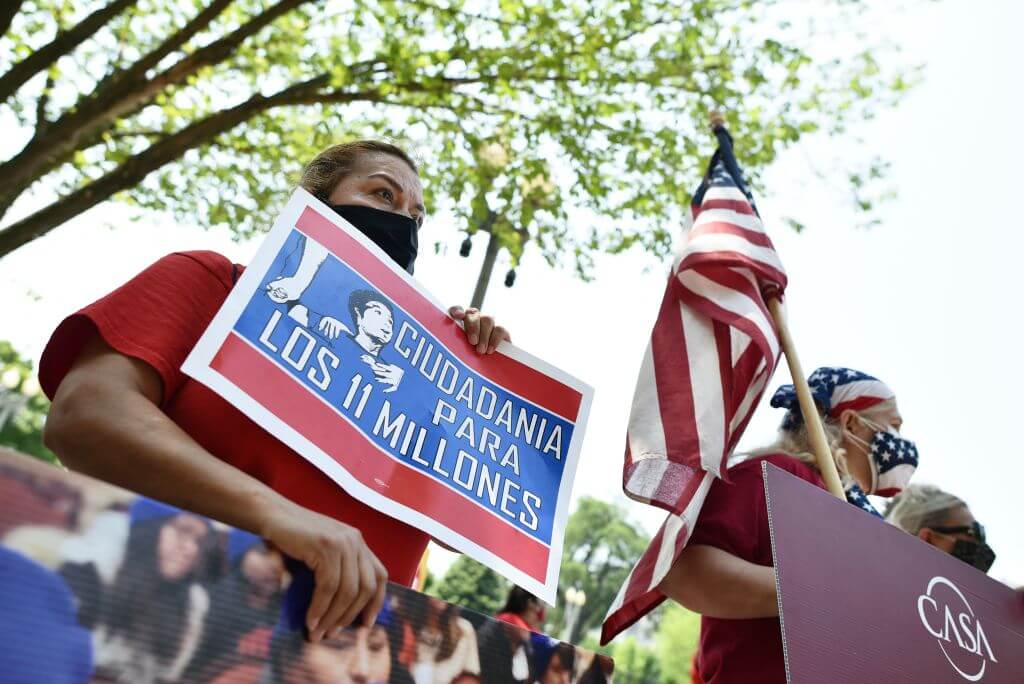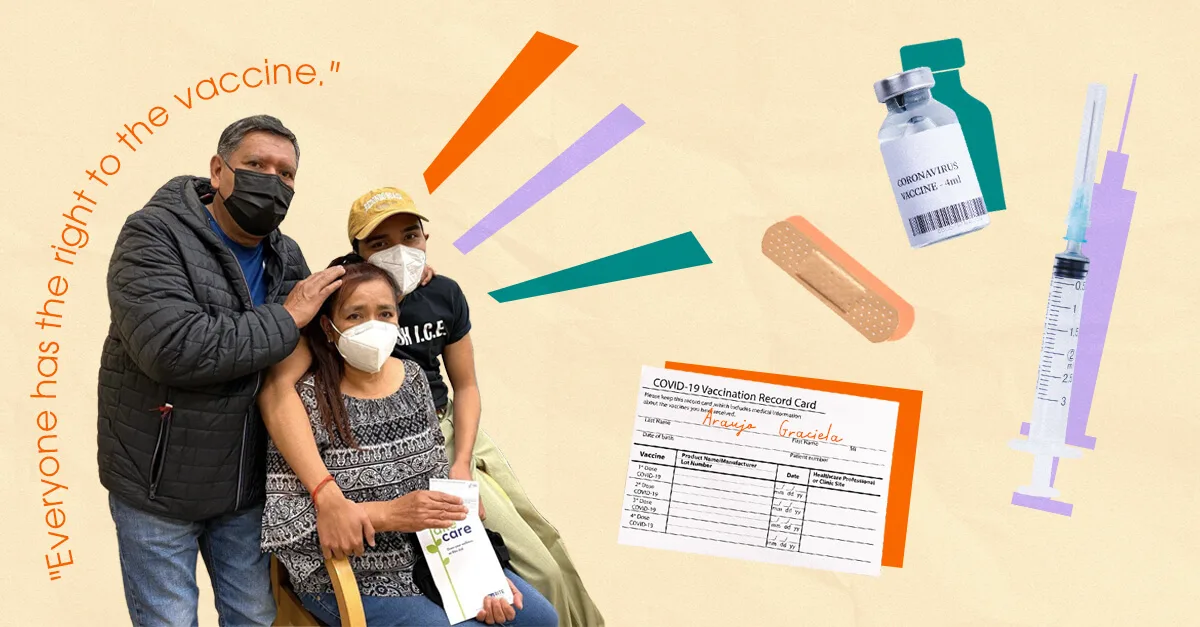
Ivon Meneses, of Las Vegas, had written "we need a permanent legislative solution for Dreamers," on her arm as she and other supporters of the Deferred Action for Childhood Arrivals (DACA) program, attended an action in support of DACA recipients. (AP Photo/Jacquelyn Martin)
Undocumented immigrants who qualify can now apply to be protected from deportation.
The Trump administration said Monday that it fully restored the Obama-era Deferred Action for Childhood Arrivals (DACA) program that shields hundreds of thousands of young people from deportation, complying with a federal judge’s order.
The Department of Homeland Security posted on its website that it is accepting new applications and petitions for two-year renewals and requests for permission to temporarily leave the U.S.
The department said it “may seek relief from the order,” signaling that its concession to the court order may be short-lived if its legal efforts succeed.
Supporters Celebrate DACA
Immigrants’ rights activists celebrated the reinstatement of DACA, including many who were accepted into the program before it was put on hold.
“This is amazing! The full #DACA program is back,” tweeted Erika Andiola, a DACA recipient who has long pushed for a pathway to citizenship for herself and others. “Now, let’s expand the program on day 1 of the Biden administration.”
The announcement is still a major victory for young people who have been unable to apply since Trump ended DACA in September 2017. His administration has long argued that DACA is unconstitutional. Those interested in applying for DACA can do so through DHS.
Organizations that work with undocumented residents immediately began to offer help with the immigration process. Aliento, a youth-led community group that previously assisted with application submissions, announced that they would begin offering virtual appointments to walk immigrants through the application process. For applicants having trouble covering the cost of fees, The Refugee and Immigration Center for Education and Legal Services offers financial application assistance for DACA applicants.
Offering Clarity
The repeated attacks, legal challenges, and attempts to overturn DACA by the Trump Administration have left the future of DACA—until now— murky at best. To help those interested in the program navigate the process, Virginia-based immigration attorney Hassan Ahmad posted his answers to a number of frequently asked questions on Twitter Tuesday.
Here are some of the most common questions Ahmad has been asked about DACA.
Can I file DACA if I came into the US after 2007?
No. The new court ruling just rolled back everything Trump tried to do to revoke DACA, so the original plan from 2012 is what’s effective now.
I got a one-year DACA work permit. Will I get a new two-year work permit automatically?
Probably not, but your one- year work permit will be valid for one year after its expiration. If you have to file to renew, you will get a two-year work permit.
How do I prove I was here between 6/15/07 and 6/15/12?
We’ve used old photos, school records, affidavits from people who knew you, old lease agreements, medical bills, traffic tickets, paycheck stubs.
If I apply for a travel document (advance parole) do I have to use it?
No, but if you meet certain requirements, you can use advance parole to “cure” an original entry that wasn’t legal. But if you qualify, yes— it can even lead to a green card.
What if I was in status (like Temporary Protected Status) between 2007 and 2012. Can I file an initial DACA?
Only if that status expired before June 15, 2012.
I had friends who filed for DACA in 2012 with very little evidence and got approved. I was scared and didn’t file. Should I be worried?
Things are not the same. Just because DACA is back for now doesn’t mean it will be as easy as it was in 2012.
I came to the US right after my 16th birthday. Can I file?
No. The requirements for DACA are stringent, and there is nothing you can do if you were too old when you came, or if you didn’t come before 6/15/07.
I have a pending asylum claim. Can I file DACA if I qualify?
Yes.
I have an order of deportation. Can I file DACA if I qualify?
Yes.
I have a felony on my record. Can I file DACA if I qualify?
No.
Do we still have to file the I-765WS with the work permit application?
Yes. It’s a good idea to have a clear statement of why you need a work permit. Attach any documents that prove why you need a work permit (a tuition bill, utility bill, medical records, etc.)
I see that USCIS may try to appeal the court order forcing it to accept initial DACA applications. Is it safe to file now?
Yes. You don’t get anything without asking for it. Use this time to collect your documentation. But generally, there is very little downside to filing.
Long Time Coming
After the U.S. Supreme Court ruled in June that Trump violated federal law in how he ended the program, Chad Wolf, the acting Homeland Security secretary, said the administration would study its options and, until then, wouldn’t accept new applications and would grant renewals for one year instead of two. DACA shields about 650,000 people from deportation and makes them eligible for work permits.
Monday’s announcement came hours before a deadline set by District Judge Nicholas Garaufis in the Eastern District of New York for the administration to post a public notice that it would accept applications under terms before Trump ended DACA in 2017. The judge ruled Friday that Wolf was unlawfully serving in his position.
DACA was started in 2012 during the Obama administration. It allows certain immigrants who were brought to the country illegally as children to work and be exempt from deportation, though it does not confer legal status on recipients.
Pathway to Citizenship
President-elect Joe Biden has pledged to reinstate DACA when he takes office in January but permanent legal status and a path to citizenship would require congressional approval.
DACA recipients and their supporters greeted the news with a mix of elation and awareness that their futures are precarious, even with Biden’s support.
Next Generation of DACA Recipients
Maria Garcia, 18, an aerospace engineering student at Arizona State University, said she will apply for the program as soon as she can. She and her parents and two brothers arrived in Phoenix in 2006 Mexico. Her older brother, now 23, is already a DACA recipient and has a job. Her younger brother, now 16, is in high school and plans to eventually seek DACA protection as well.
Garcia said the court’s decision last week “was wonderful news.”
“There are a lot of other students who are undocumented who don’t qualify for DACA. They have to find a permanent solution,” she said.
Michelle Celleri, an attorney at advocacy group Alliance San Diego, was preparing an application for a client who was putting the final touches on her petition when Trump canceled DACA in 2017.
“Her feeling is, ‘I’ll do anything. I’m sick of being in the dark and I want to move forward,’” Celleri said.
Celleiri said she is advising clients to submit applications before Dec. 22, when there is a key hearing in Texas in a lawsuit by several states challenging DACA’s legality.
“There’s just way too much happening right now,” she said. “I don’t want people caught in the crossfire.”
The Associated Press contributed to this report.
Continue Reading: Thousands of DACA Recipients Are Working On the Front Lines To Keep Us Safe From COVID-19
Politics

Teamsters and UPS Reach Tentative Deal to Avoid Strike, 340,000 Workers to Get Raises
The tentative deal represents a huge win for full- and part-time UPS Teamster workers, who would get significant pay raises and better working...



One Republican Senator Is Blocking 265 Military Promotions, Leaving the Marines Without a Confirmed Leader
Sen. Tommy Tuberville's decision means these military officers are not getting the pay raises they’re owed, cannot move their families to wherever...
Local News



Teamsters and UPS Reach Tentative Deal to Avoid Strike, 340,000 Workers to Get Raises
The tentative deal represents a huge win for full- and part-time UPS Teamster workers, who would get significant pay raises and better working...



One Republican Senator Is Blocking 265 Military Promotions, Leaving the Marines Without a Confirmed Leader
Sen. Tommy Tuberville's decision means these military officers are not getting the pay raises they’re owed, cannot move their families to wherever...




